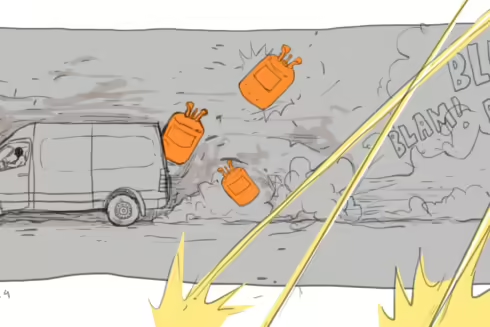April 21, 2024. Dorohoi, Botoşani. A Police crew on the night shift signals a Mercedes Sprinter to turn right. Only one passenger gets off. Instead, the driver steps on the accelerator.
The chase
The crew starts after the van, but a VW Touareg bizarrely gets in their way. The police lose the Touareg and catch up with the van. They fire 61 bullets, shoot at the tires, and when they leave the Dorohoi residential area behind, also shoot at the driver. Only the fourth unloaded magazine manages to stop the fugitive, after two shots hit him in the shoulder and kidney.
The chase lasts less than four minutes. The cops get out of the Duster. One of them, still aiming his weapon, goes to check on the driver, while the other checks the back seats. He finds nearly 100 bottles of smuggled freon, a powerful greenhouse gas, brought over from Ukraine.
On the local black market, this whole load costs almost 20 thousand euros. If they reach Berlin or Vienna, the cylinders in the Sprinter could be sold for 50 thousand euros.
The scene in Botoșani is not the first of its kind in northeastern Romania. Snoop has found a carbon copy of this scenario in a 2018 criminal case. It also unfurled a stone’s throw away from the Ukrainian border, in the neighboring county of Suceava. A van carrying 1.5 tons of freon was summoned by the Border police to stop.
Likewise, the driver revved the engine.
He wasn’t shot, but he pulled over after a much longer chase and several gunshots. That transport was shielded by a BMW 7 Series with foreign license plates, and visibly tried to confuse the police who were chasing after the suspicious minivan.
In March, the New York Times published a story about a similar case: „He’s Accused of Smuggling, but Not Drugs or Guns: It’s Greenhouse Gasses„. The USA have just convicted their first smuggler of HFC gasses, as freons are alternatively called.
In 2021, experts from the environmental NGO Environmental Investigation Agency (EIA) published a report on global freon trafficking, and Romania was listed as the main gateway to the European Union for these toxic smuggled chemicals. The EIA had previously made the front page of Romanian newspapers, when it documented the Schweighofer corporation and its illegal cutting of national forests.
Who are the freon keepers?
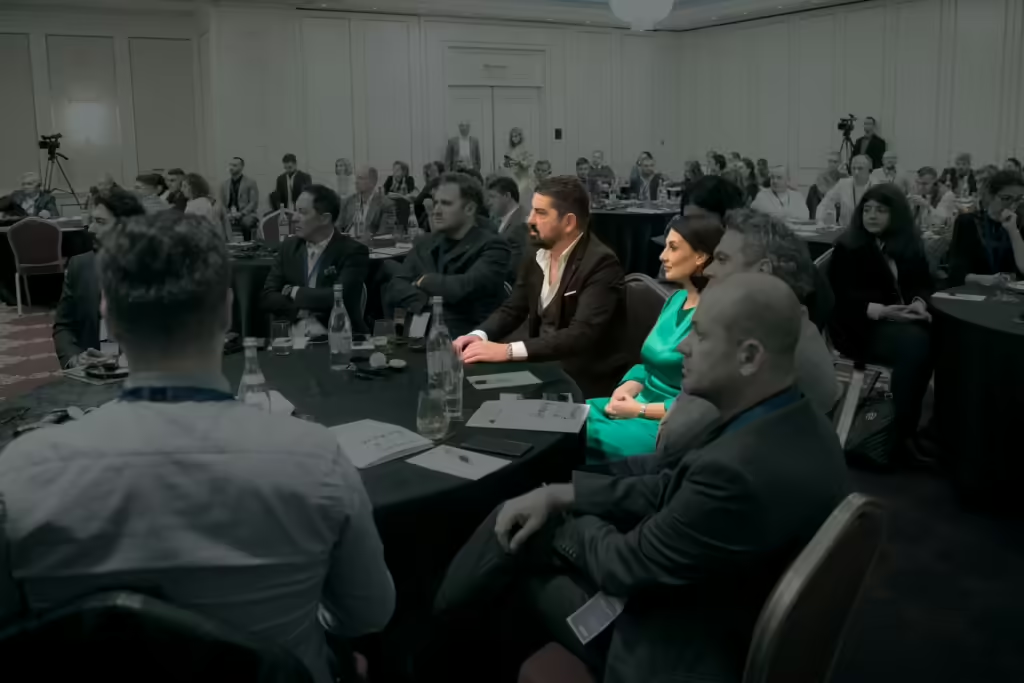
Amalia Păvălucă and Emre Gunay at a meeting with authorities held at the Marriott Hotel. Photo collage by Ionuț Mateș
November 15, 2023. Bucharest. In a conference room at the Marriott Hotel, the head of the Environmental Guard, Andrei Corlan, and Ion Cupă, the then head of Customs, are talking. They’re attending the launch of the F-Gas Companies Association. The newly established NGO states that it seeks to represent the „refrigeration industry” in its relationship with the Romanian Government and to monitor the implementation of the European directives that regulate freon, one of the most toxic chemicals in our lives.
We use Freon every day that we use deodorant, every night we sleep on a foam mattress, every time we put out a fire with old fire extinguishers. There’s freon in the cars we travel with, in our air conditioners at home or at work, in the refrigerators where we keep our food, or in the stores we buy it from.
More than half of Romanians (57%) prefer the temperature in their homes to be at 21 to 23 degrees in the summertime, while four out of ten people (42%) use the air conditioner almost daily, reveals a survey published on June 11, by national energy company E.ON, as publicized by state-run news agency Agerpres and quoted by online news platform G4Media .
Freon is all around us and is also known as a cooling agent (CA), thermal fluid, refrigerant gas, hydrofluorocarbons or HFC gasses. Freon is a greenhouse gas. Its release into the atmosphere enables the sun to roast us, the air to get hotter and, lastly, the weather to fluctuate aggressively.
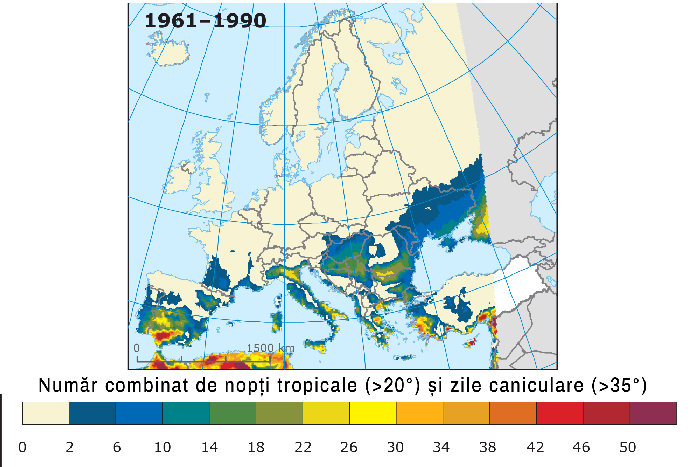
The cold sellers are the entrepreneurs of the future and they’re present at the Marriott event, together with the two heads of public institutions. With global warming, their goods have become more and more expensive, and underground a black market has developed, which must be stopped by the Environmental Guard and Customs. The authorities outrightly say that this is what they’re going to do.
Freon is part of a class of greenhouse chemicals. This is what has brought them together at the Marriott.
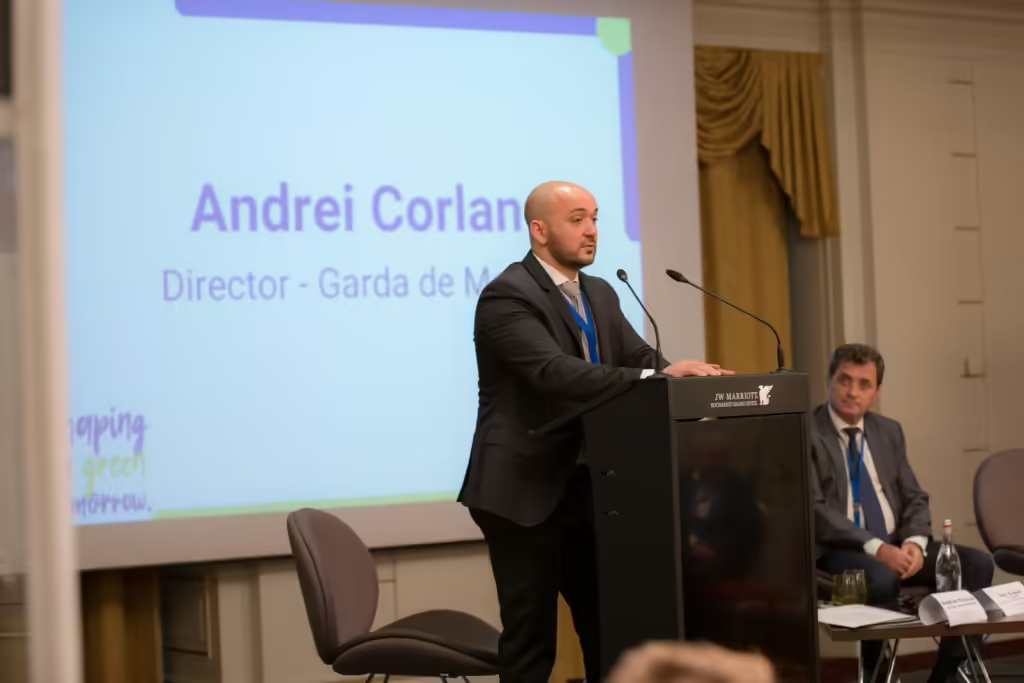
„The current environmental legislative framework is not efficient enough to really combat illegal gas trafficking,” Andrei Corlan, head of the Environmental Guard, says with great concern.
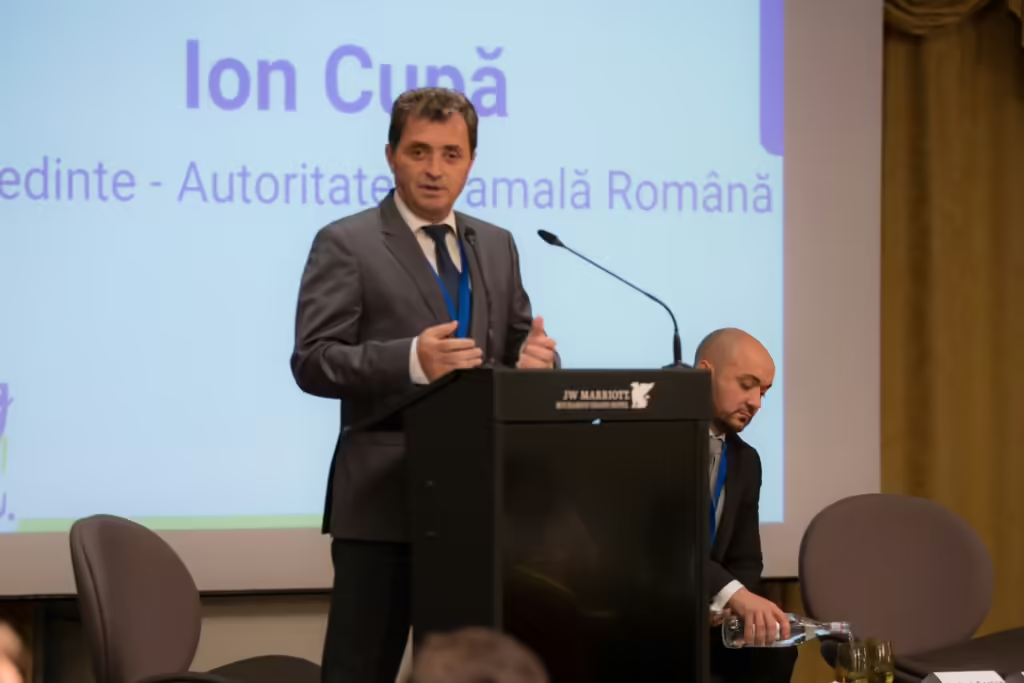
„We pay special attention to combating the illegal trade of fluorinated HFC gasses,” complains Ion Cupă, head of the Customs Authority at the time, replaced in January 2024.
„We are more than an association, we are a community of leaders, thinkers and pioneers, united in our mission to make the world a more ecological and sustainable place,” states Amalia Păvălucă, president of the F-Gas Companies Association on the NGO website.
She was also the host of the event at the Marriott, where her organization pledged to donate equipment to the Customs Authority to identify environmentally harmful gasses when they are detected at the border. They are the first devices of their kind to come into the possession of Customs authorities.
Sometimes, the speakers at the event explained, traffickers import cylinders that say they contain ecological gasses, which are, in fact, filled with much more toxic chemicals, such as some types of freon that have already been banned in the EU.
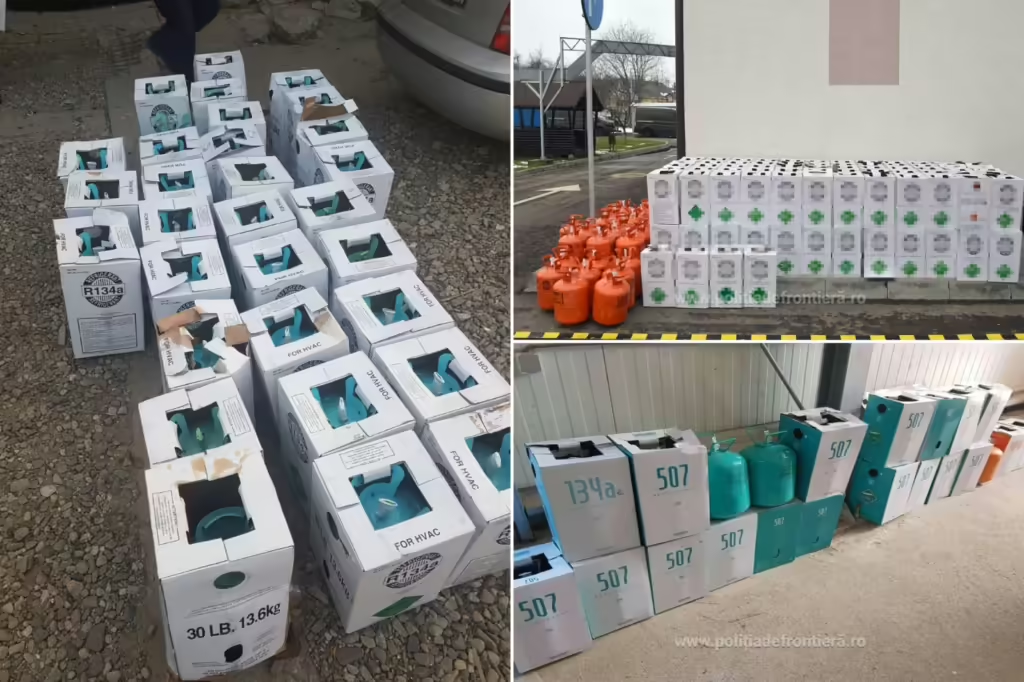
Seizure of Freon cylinders by the Border Police
The companies run by Amalia Păvălucă
Amalia Păvălucă’s name is featured in the structure of more than ten wholesale companies that sell and buy freon⸺the EMG Invest group of companies.
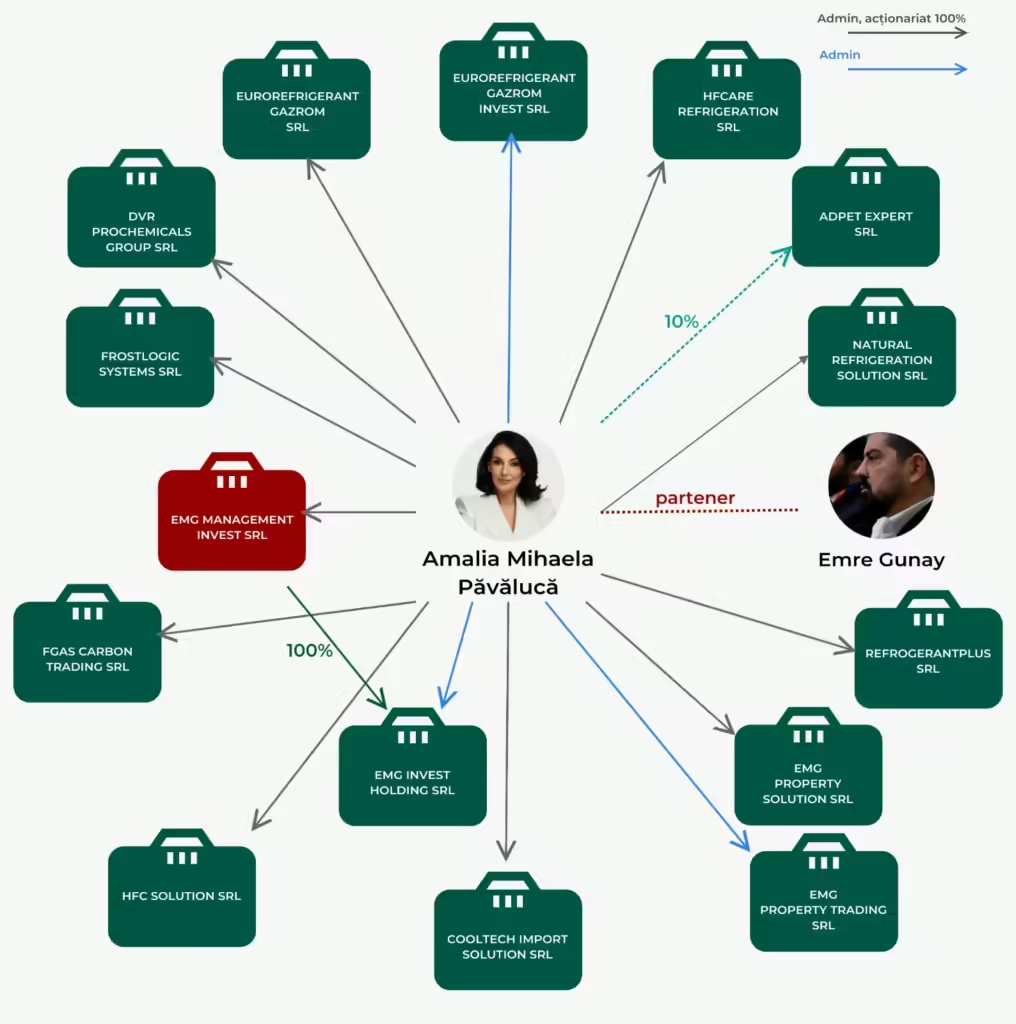
The group owns the Eurorefrigerant website, a brand sold on several European markets. Her partner, Emre Gunay, is the man behind the businesses that feature Păvălucă. The two have been importing freon from Turkey for over five years, through several commercial companies, and during the pandemic they also brought protective equipment, which Amalia posts on Facebook groups.
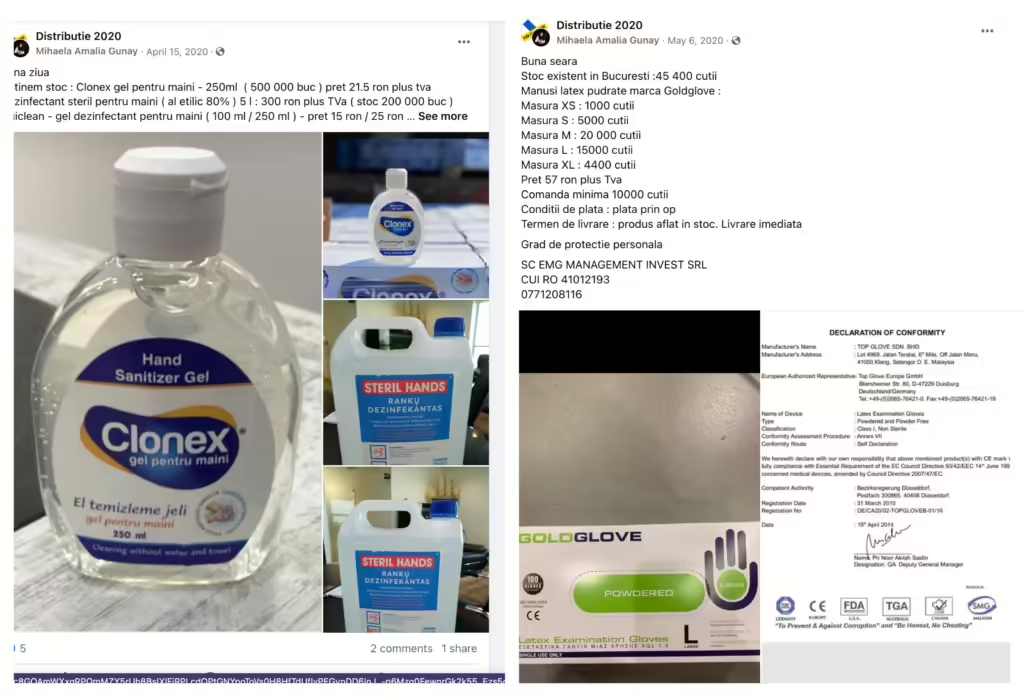
The group of companies led by Amalia Păvălucă is among the traffickers documented in the 2021 EIA report, but her name as a shareholder is not mentioned. At the time, she was selling five tons of smuggled freon, which she offered to undercover EIA investigators.
That same year, the European Anti-Fraud Office (OLAF) alerted the Romanian and Bulgarian authorities about several shipments totaling 76 tons of illegal freon that were to arrive from Turkey to Romania. According to sources involved in the European anti-fraud investigation, a substantial part of the 76 tons was supposed to reach the EMG group and the very same Amalia Păvălucă, who shared the stage at the Marriott with the head of Customs and the head of the Environmental Guard, just two years later.
After the illegal shipment was intercepted by the authorities, Amalia and her business partner told EIA investigators that they could no longer deliver the goods promised in their offer.
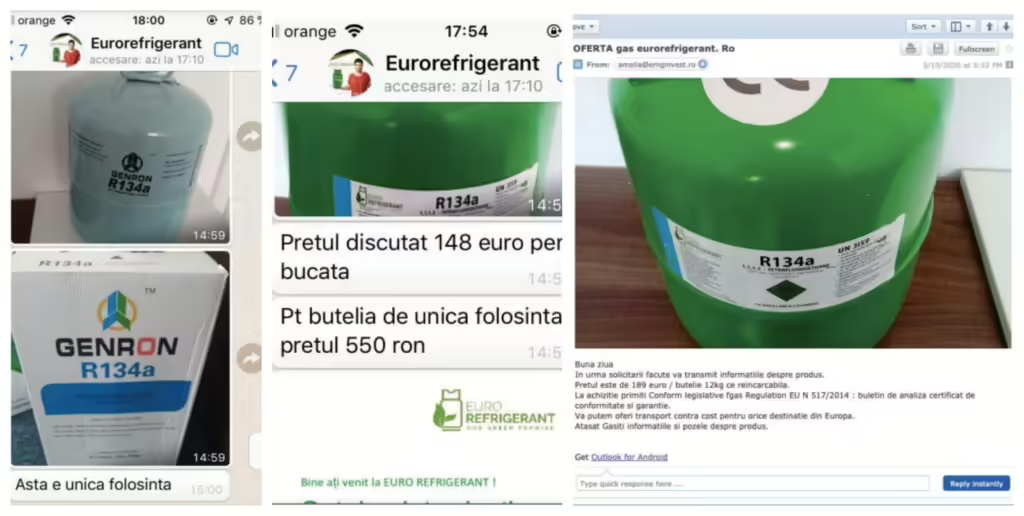
Price negotiations for freon cylinders offered by the EMG group. Source: The 2021 EIA report
Meanwhile, Păvălucă and her partner grew a business empire. In 2020, they owned an old BMW X5. Today they drive a Lamborghini that was actually purchased through the freon company, EMG Management Invest SRL, which was to receive a share of the 76 tons.
Following the EIA investigation, the Ministry of the Environment notified the National Anti-Corruption Agency (DNA). The Bucharest DNA office sent the case over to DNA Suceava. The file continued to circulate: it was taken to the Prosecutor’s Office of the Suceava District Court, which sent it to colleagues at the Rădăuți Prosecutor’s Office. In turn, they sent the file to the Prosecutor’s Office of the Suceava Court, where it is still located at present.
Freon toxicity (click for details)
Cold chains, air conditioning, heat pumps, etc. – as experts call temperature-controlled spaces – are regulated by national legislation, by the European Union, and by several international treaties which Romania has joined: the Montreal and Kyoto Protocols.
The reason is simple: refrigerants (thermal fluids) with various applications in the cold industry can be toxic in abnormal temperature and pressure conditions, they destroy the ozone layer. This leads to an increase in harmful ultraviolet radiation, which reaches the Earth’s surface and contributes to global warming through the greenhouse effect.
Chlorofluorocarbons (CFCs) and hydrofluorocarbons (HCFCs) deplete the ozone layer and are regulated internationally by the Montreal Protocol (1987), strengthened at EU level by Regulation 590/2024. Hydrofluorocarbons are substances regulated at European level by Regulation 573/2024 of the EU. CFCs, HCFCs and HFCs are all also known as refrigerants or, less scientifically, freons, F-Gases and ODSs.
Since 2006, the Montreal Treaty, as well as the European regulations and directives, have imposed an ever-lower level of annual consumption on states. The European Commission charts each country, and the gas quota with which we can cool ourselves decreases once every three years for each individual commercial company.
By 2030, through the EU’s Green Deal agreement, Europe has set out to remove from all systems 79% of these environmentally harmful chemicals, some of which are toxic. By 2050, they’re supposed to not be in use at all anymore (through the target of 0 greenhouse gas emissions). Furthermore, it is the responsibility of each individual country to ensure that companies which sell and buy freon or freon technologies have ever-lower annual quotas and are migrating to greener cooling and heating solutions.
The largest illegal shipment of freon that was supposed to reach Romania
Snoop identified one of the customers who was supposed to receive a part of the 76 tons of smuggled freon intercepted by the authorities in 2021. The customer learned about the origin of their order from the Snoop reporter.
This commercial company has maintenance contracts with slaughterhouses, hypermarket chains, shopping malls, and they were even subcontracted for publicly funded projects. One of the associates within the company agreed to speak to Snoop on the condition of anonymity, as she wants to get her money back „from this freon dupe”, but fears for her safety. We will call her Maria*.
Before 2017, Maria was legally importing freon through her company, directly from China. But the business grew smaller and smaller and, gradually, it came to buy less and less from the middlemen.
In 2020, Maria ordered several thousand euros worth of freon from a Turkish citizen she found on Romanian e-commerce platform OLX, where such ads, at prices well below market average, are common. It all added up to a ton of R404A, an industrial freon used by slaughterhouses and sausage factories for refrigerators of hundreds of square meters, just like the one hunted down by the police in Dorohoi. The goods were to be delivered in 2021. She paid the advance and has been waiting for the freon ever since.
The Turkish citizen’s name is Goma, and the company to which she paid the advance is called Goma Multicomerț and is registered under the name of his partner.
A year later, Maria continued, Goma apologized for falling off the radar and kept explaining that his intention was not „to dupe her”. In fact, he confessed to her, the freon cargo that was supposed to reach her had been blocked by customs authorities. He didn’t tell her anything about international confiscation.
The refrigerating agent ordered by Maria was further sold by her company and was supposed to reach the facilities of one of the largest meat processors in Romania, which sells mince meat patties and the hotdogs we see advertised on all TV channels.
After being tipped off by OLAF, Romanian customs authorities blocked the importation of the smuggled freon that was supposed to be delivered to Maria’s company. This kind of blockade occurs when importing companies are either not authorized by the European Commission to trade freon, or when they’ve exceeded the EU-imposed quota, as per their authorization, and are not allowed to import any more.
However, Goma Multicomerț SRL is not listed among the companies which were supposed to receive the 76 tons. Financial data obtained by Snoop shows that, for several years now, Goma Multicomerț has been purchasing freon from the EMG group, controlled by Amalia Păvălucă and Emre Gunay. The two appear in customs documents as recipients of part of the 76 tons of freon intercepted with the help of OLAF.
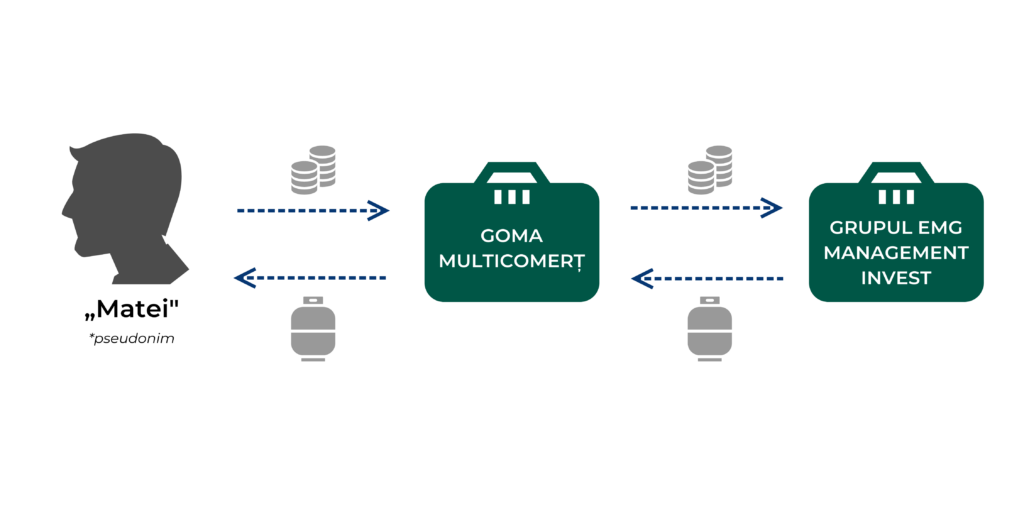
Goma confirmed for Snoop that he worked with the EMG group, but that he never discussed business with Amalia Păvălucă, only with Emre Gunay, her partner. Although EMG reported to the Fiscal Authority that it collected 163,923 lei from Goma Multicomerț, the man claims that the money circulated in the opposite direction. In other words, he didn’t buy freon from them, he sold freon to them and collected a „roughly equal” amount for „100 or 150” cylinders.
„In 2020 he was at my office and I had a talk with Emre about some freon bottles. I was talking to him. I saw her (Editor’s note: Amalia Păvălucă) once or twice by Emre’s side, but we only said hello to each other.”
Goma described the chaos of 2020, when the authorities didn’t know how to manage freon imports, noting that all the control institutions were onto him.
„It was like a banana republic, neither Environment nor the Customs Directorate knew what freon was used for, nor did the customs officers know what we do, how we do it, how we go through customs. I don’t know if they’re educated now, if they’re better informed.”
He claims that, following several checks and fines, he left the market in 2021, under the pressure of restrictions imposed by the Environmental Guard. „I had placed an order in China, which was supposed to pass through Istanbul and then come by land, on trucks, to Romania. There were 5 containers. After two truckloads were imported, Environment came in and informed us that we were no longer allowed to import, but they didn’t know what they were supposed to do either.”
But, he insists, he never imported single-use cylinders, changing his order from China to refillable cylinders, according to Environmental Guard instructions. Goma also said he could clarify the Emre Gunay situation regarding the financial transfers identified by Snoop reporters, but never came back with details about this.
Another huge seizure of smuggled freon took place in Spain in 2022. It was called Operacion Marum. The Spanish tax authorities, Guardia Civil, Europol and OLAF then seized over a hundred tons of freon.
One of the traffickers targeted by the Spanish investigation is called Jorge Gutierrez Marmol, and EMG had been supplying him with freon since 2018. Financial documents consulted by Snoop show that in November 2018, for example, the Spaniard paid EMG a total of 415 thousand euros⸺but we could not verify the type of gas delivered then, or other more recent deliveries.
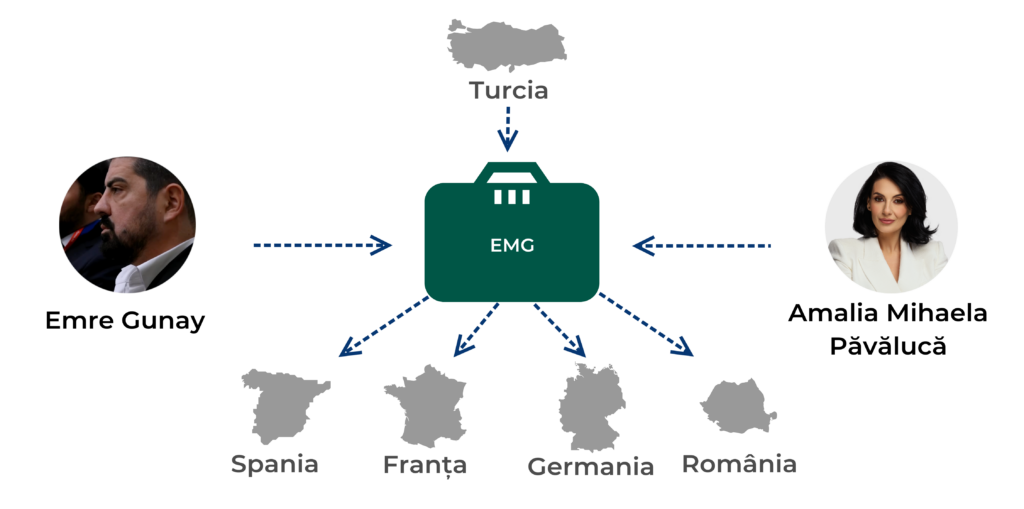
The EMG group led by Amalia Păvălucă and partner Emre Gunay brings freon from Turkey and sells it further, through Romania, in European countries.
What institution heads have to say about their presence at the event with Amalia Păvălucă’s group of companies (click for details)
Andrei Corlan, head of the Environmental Guard, says that he “took part in that event as a result of an invitation sent to my office. The institution’s relationship with any company, regardless of its name, is one of inspection and control.”
The former head of Customs gave the same answer. When asked about Amalia and her partners, Ion Cupă told Snoop that „it was an official invitation that came through the office and I attended, just as I attended to so many other events.” He also added that „They (Editor’s note: Amalia Păvălucă) knew each other from the (Customs) Control Directorate. Alexandru Dudu, the head of the General Directorate of Customs Control, I know them from him, came to me and told me that there were people who wanted to donate, but I didn’t know them”.
Amalia Păvălucă contradicts herself: there are no traffickers, but the Romanian state is apprehending them
Another company represented by Amalia Păvălucă’s group is Cold Store SRL.
The import-export company, owned by two Turkish citizens who do not live in Romania, is represented at the Trade Registry by Amalia Păvălucă herself. The e-mail registered for Cold Store SRL is emre_gunay26@********.com, in the name of Amalia Păvălucă’s partner.
Cold Store made purchases worth 210,000 euros from the Turkish company that operates the Ice Grup brand in Istanbul. They are still selling extremely toxic freon, which is already banned in the EU, but were authorized to import it through a company owned by the same Amalia Păvălucă.
We asked her what Cold Store SRL bought in June 2018 from Turkey worth 210,000 euros, but she refused to answer. She also initially refused to answer several questions, after we contacted her as the head of the F-Gas Companies Association.
As an industry lobbyist, she offered us „a long-term collaboration”, in order to publish „beautiful articles.”
I asked her why she thinks that the authorities are paralyzed by freon smugglers, which even public institutions heads acknowledged at her association’s event. She interrupted us abruptly:
”Sir, what you’re saying is gravely mistaken. The authorities are not paralyzed, things are on the right track. My opinion is that you should change your approach. I’m telling you as the president of the association and as a representative of the industry. We are satisfied with the authorities, with how things are progressing.”
Amalia Păvălucă, EMG group president
How does one go about buying smuggled freon from classifieds sites like OLX or Publi24?
„What you see now on OLX is maybe 10% of what was there 3-4 years ago. You want to document a topic that’s already passé.” She also explained that traffickers can be fined, but criminal cases are never opened against them in Romania, unlike in the rest of the European Union. In Romania, if they’re not caught upon entering the country, they escape thorough controls and checks.
Bothered by the word „smuggler”, Amalia Păvălucă said:
„You need to do more research, the Environmental Guard and the Customs Authority have caught so many illegal gas imports. Romania should not be presented like this, because it would be totally wrong. Romania has evolved over the past two years. The Customs authorities are really getting involved and have caught so many imports and put an end to them.”
Păvălucă’s argument is that the Romanian state does not feature in European Commission reports on this topic.
If you compare the report released by the European Commission in 2021… Have you seen this year’s report? Have you seen Romania in the report? This year they’re talking about Bulgaria and other countries. So the Romanian authorities are really showing their interest.
Amalia Păvălucă
As I didn’t know which European Commission reports Păvălucă was referring to, I asked her to send them to us after the end of our conversation. She sent us the 2024 EIA report that targeted Bulgaria, claiming that Romania is not featured in it, because it has made progress and the authorities have done their job.
What Amalia Păvălucă left out was the 2021 EIA report, which followed the issue in Romania and which featured the EMG group, led by none other than herself.
Despite this 2021 report, when she was filmed with a hidden camera as she negotiated smuggled freon, over the years, Amalia Păvălucă has become one of the most quoted voices in Romania’s „cold” industry. She has even been quoted as an expert in elaborate journalistic materials. The PR campaign continued through her newspaper and magazine appearances.
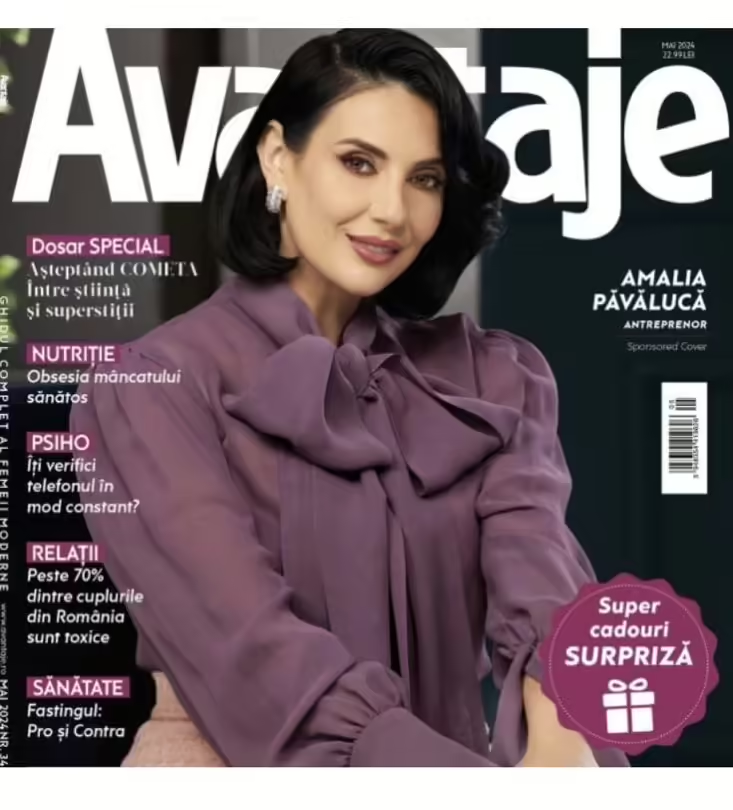
Sponsored ”Avantaje” magazine cover
For example, in July 2021, when the EIA published the report incriminating the group she led, Păvălucă gave expert statements to several publications on that very same report.
„The HFC black market has devastating consequences for businesses, individuals and the environment. In addition to supporting criminal activity, any company involved exposes itself to serious security risks, as no one can guarantee the quality of illegally imported cylinders or their contents. Research shows that 83% of those making up the refrigerant value chain know about this illegal trade, and 72% have received single-use cylinders, which are banned in Europe,” Amalia Păvălucă claimed at the time⸺yet without specifying who did this research and on what.
In her dialogue with the Snoop journalist, she insisted that three out of four refrigeration technicians have worked with smuggled freon, but that Romania was not featured in the European Commission report, „because the authorities did their job.” She also mentioned the donation made by her association.
„We’re going to receive the other analyzers, up to ten. They will be distributed to all regions. We, as an association, have come up with effective solutions from our practice. The Customs Authority and the Environmental Guard have agreed to employ them. Training will be held at this level. Things have evolved.”
When we sent her a series of questions about her business and meetings with state representatives, Amalia Păvălucă stopped answering our phone calls.
How profitable the illegal freon business is
With increasingly extreme weather events and record temperatures, the demand for and the price of these gasses have steadily increased.
A 2022 analysis published by Instal Focus, an installation news and analysis portal, shows that public tenders for air conditioners are multiplying. In the first semester of 2022, for example, the Romanian state alone needed 18,135 air conditioners, in over 300 publicly funded projects all over the country. Hospitals, schools, town halls, military units – almost all public institutions need heaps of air conditioners.
In 2021, the Romanian air conditioner market was estimated at 65 million euros. Another analysis by online retailer evoMag shows that sales of air conditioners to individuals doubled from 2022 to 2023, the hottest year in recorded history.
And the black market is flourishing along with the legal one. In 2020, a black market freon cylinder cost 50 euros; today it costs almost 200 euros. When purchased directly from manufacturers or authorized distributors, prices for some of these gasses can almost triple. One such cylinder can supply freon for nearly 20 cars, for instance.
Our country’s geographical position has made us a key entry point into the EU for smuggled freon. Smuggled goods come from China, pass through Turkey or Ukraine and reach us, like these containers detected by Constanța Customs between Christmas and New Year or this cargo truck that was staked out as it passed through the port by customs officers and environmental inspectors.
In Turkey, a freon cylinder costs 50 euros today. In Bucharest the price goes up to 200 euros, and in Germany or Austria the same cylinder can be worth up to 700 euros. These price differences can make a single transport on the Istanbul-Berlin route rake in almost 200,000 euros in net profit.
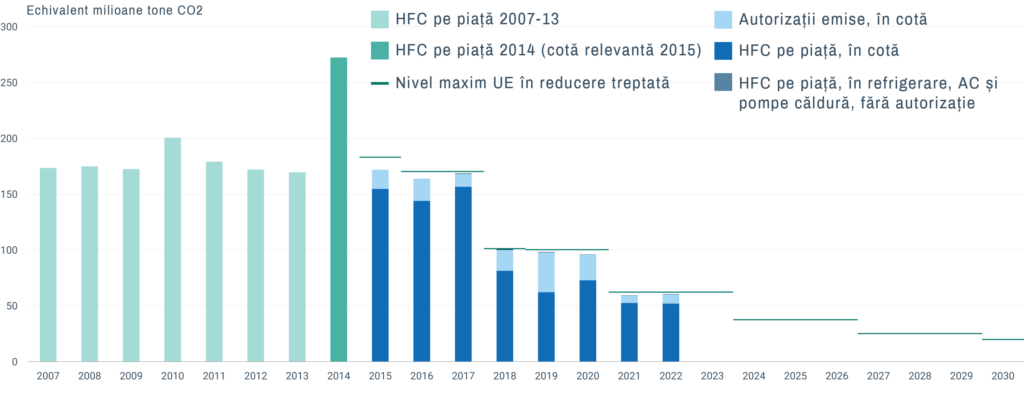
Graph of freon (HFC) reduction according to EU quotas
It’s cheaper to buy smuggled, rather than recycled freon
Fin Walravens, an expert in these chemicals with EIA NGO, has been studying the markets for almost 20 years. Walravens tells Snoop that right now it’s cheaper to buy smuggled freon rather than recycled freon. He says countries should encourage more recycling.
In its National Recovery and Resilience Program (PNRR), Romania has allocated 220 million euros for recycling factories alone. So far, no recycling plant has received the PNRR funds because the deadline for submitting the files has been postponed until July.
A professor from a leading Romanian university, with over 20 years of experience in the field of refrigerants, says he volunteered to design the national strategy for the recovery, recycling and regeneration of freon. He concluded that „nothing can be achieved without a lot of money.” He was referring to the European funding that Romania has failed to access.
The same professor, who prefers to maintain his anonymity, remembers that „before we entered the EU we benefited from some funds, at a very large scale. There were recycling centers, with facilities, with Romanian know-how, there were many companies that became regional centers, coordinated by a large profile company from Bucharest under a national project of the Environment Ministry. The second we entered the EU, we became a developed country and we no longer benefited from a single cent, and the recovery and recycling centers were no longer supported and therefore closed down.”
Forced by European Union rules on pollution, the Romanian state has also regulated the recycling of freon through Government Emergency Ordinance no. 5/2015 and Government Decision no. 192/2020, but it is unable to ensure that these directives are actually observed.
Some commercial companies only collect the chemicals, others only transport them, but very few have the capacity to recycle the freon and return it to the commercial circuit. There is only one freon incineration center in all of Romania, in Timișoara, and no company that recycles it.
Mihaela Sofrone, communication manager at GreenWeee, one of the largest private recyclers in Romania, explained to Snoop that the procedure for recovering and recycling freon is very expensive and not every company can afford to purchase the technology.
Equipment to recover HFC gas from installations costs thousands of euros, and the cost of recycling technology goes up to several millions, depending on the type of refrigerant and its location in different appliances and machines. GreenWeee only recovers and incinerates it. This is why there are a lot of recyclers that scrap refrigerators and air conditioners for plastic and metal, but without recovering the freon in their tubes and polyurethane foam.
Thus, toxic gasses are being systematically released into the atmosphere. And the black market is actually flourishing, at the expense of recycling.
Through national recycling programs, the state is actually polluting with freon
Diana Grosu, from Asociația Ecotic, an independent NGO that monitors recyclers, says that „too many” scrap metal shredders are shredding refrigerators filled with foam, just as car recyclers are shredding cars with loaded installations. She explains that refrigeration equipment contains freon in its thermal insulation foam and in the cooling system, i.e., the cylinder behind the refrigerator.
Equipment to recover the gas from a pipe and hose installation costs only a few thousand euros, but it’s not a priority investment for all car services, nor for recyclers.
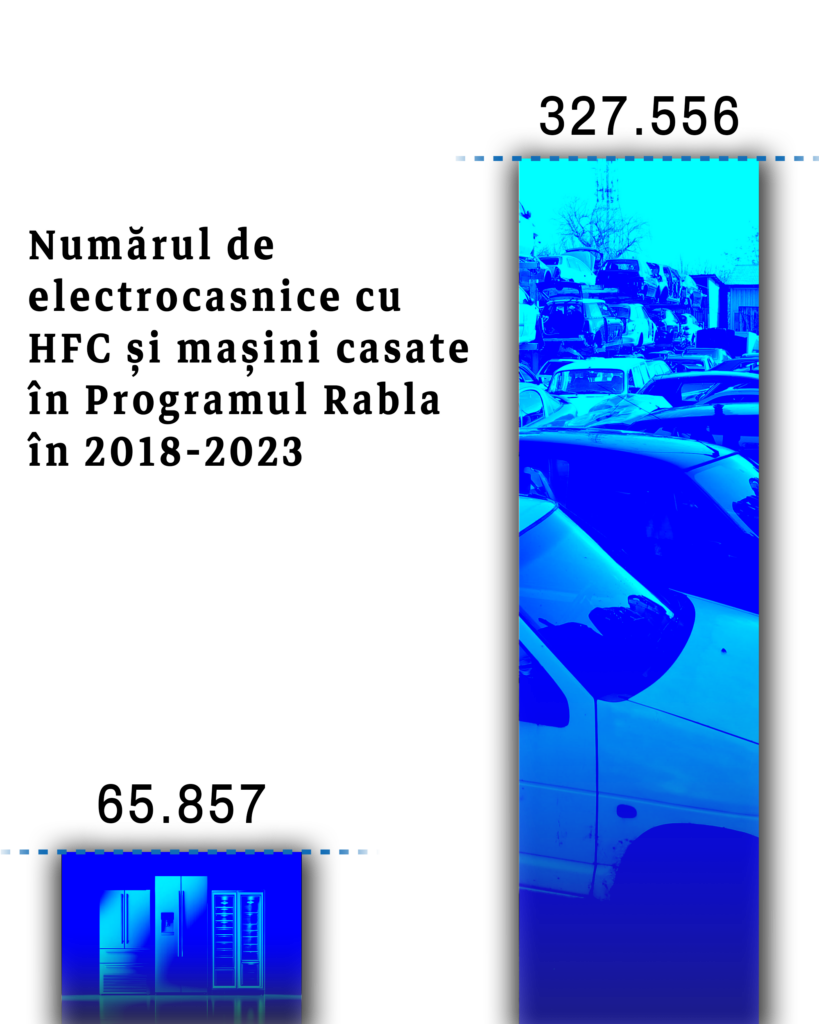
160 tons of freon had to be recycled by the Romanian state (click for details)
If we only look at the state’s official statistics, the Rabla National Program for Home Appliances scrapped 65,857 refrigerators, freezers and refrigerators until 2023. In the same time frame, the Rabla National Program for cars destroyed a total of 327,556 vehicles.
If we do the math with a reasonable margin, we could say that the state should have recycled at least 160 tons of freon. Former head of the Environmental Guard Octavian Berceanu believes that the Romanian state wasted much more freon by releasing it into the atmosphere. Yet he put forth no actual figures because, he claims, the Environmental Guard has no record of this. Berceanu states that the Guard doesn’t even have the equipment to test imported freon or freon retrieved from commercial operators’ facilities.
The National Agency for Environmental Protection (ANPM) officially collects data from all recyclers in Romania. The institution should know how much freon has been recycled, broken down by each refrigerator shredding company, for instance. Every year, recyclers submit a form to the ANPM, in which they report the breakdown of waste, glass, plastic, freon „and others.”
- In a discussion with Snoop journalists, the Chemicals and Communication Services of ANPM admitted that no one reports anything to them about freon and redirected us to the Ministry of the Environment.
- Agency officials recommended that we also make a public information request to the Government. The latter forwarded our request to the Environmental Guard.
- The Environmental Protection Agency does not have recent and substantial information about freon either.
The institution specified that it only has data from 2019, for 402 kilograms of freon, recovered from old installations in the Rabla program. They came to this conclusion following checks they carried out themselves, not because they were reported to them by any economic operator. According to the same Environmental Guard response to Snoop’s request, the companies that trade refrigerant gasses are mandated to keep the documents for the goods they have traded for five years, for potential inspections, but do not report anything in real time to the Romanian authorities.
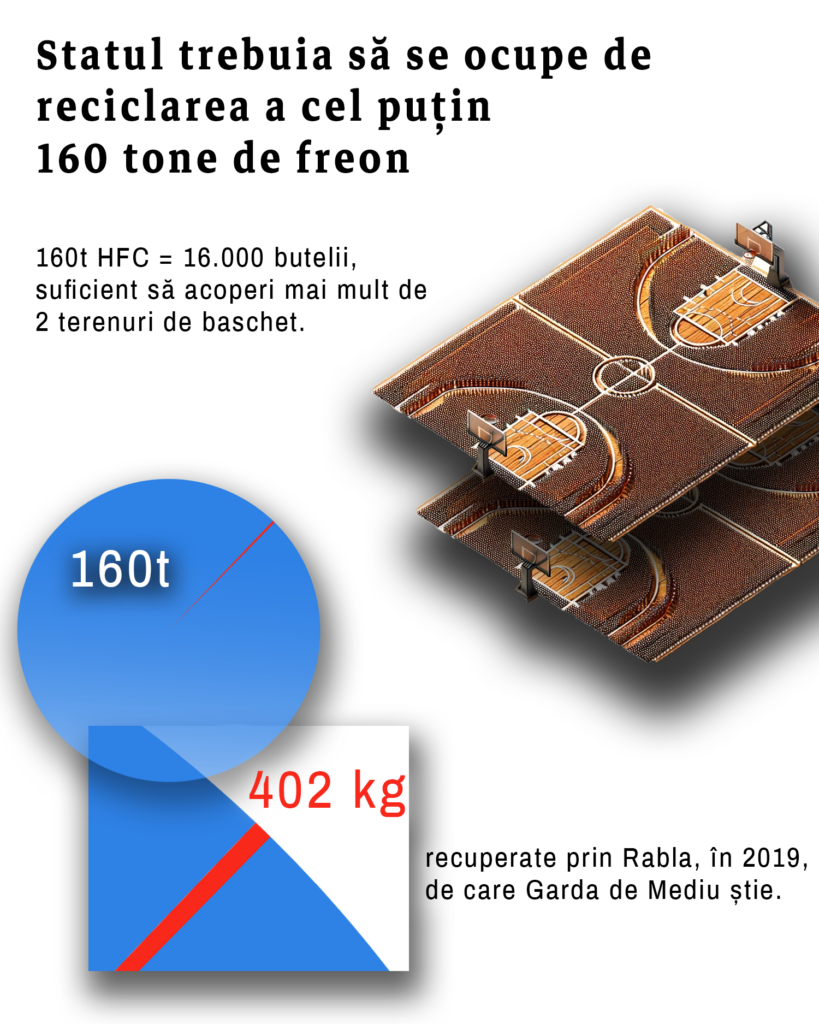
At the same time, recyclers in countries such as Australia or the United States annually collect thousands of tons of used freon, clean it and put it back on the market, destroying thousands more.
The Environmental Protection Agency, the Environmental Guard, the Environmental Fund Administration and the Environment Ministry are the four Romanian institutions that have the power to regulate, control and monitor chemicals such as freon. They all trip up over each other and neither is effective because of poor cooperation, believes Fin Walravens of the EIA.
Because there is a non-functional reporting system for freon collected from appliances, the head of the National Environmental Guard, Andrei Corlan, wants to launch an application for reporting freon transactions, RO-GAS. However, when contacted by Snoop via telephone, he confessed that he doesn’t have a concrete plan for the application just yet, but will impose „the obligation to register all importers, transporters and recipients in an electronic application according to the ROAFM model,” an app where companies that manage waste can report imports and exports.
A 2022 legal initiative proposed a new document: the environmental record. At the proposal of the then Environmental Guard management, each company, village or city was supposed to be featured in a special database of environmental offenses and fines. Thus, the state would have had a record of polluters and would have been able to identify the most problematic ones. But the draft didn’t pass.
The former head of the institution, Octavian Berceanu, tells Snoop that if the Customs Authority had not opposed it, we would now have a database of all environmental crimes, and meetings like the one at the Marriott could no longer have publicly happened.
Smuggled freon all over the place
Today, there are impressive amounts of refrigerants for sale on the internet.
Freon is sold in cylinders, and the markings on the cylinder makes it clear whether or not the product comes from the black market. Single-use cylinders have been banned by European legislation since 2007, and reusable cylinders, which have identification data that makes them trackable, have been imposed in their place.
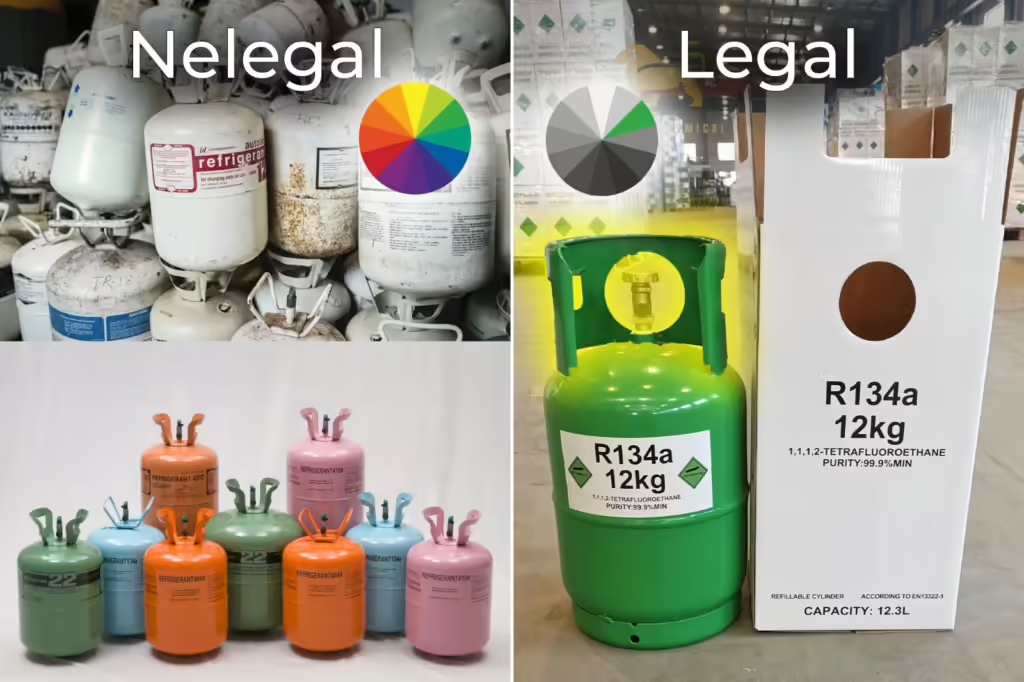
For over ten years, however, ads for single-use cylinders have been constantly posted on OLX, even though the Customs Authority was not supposed to accept their import, and the Environmental Guard was supposed to confiscate them directly from online merchants. For example, much of the mammoth shipment of 76 tons of CFC blocked at the request of OLAF in 2021 was made up of single-use cylinders, i.e. contraband.
The young man who was shot in Botoşani also had disposable cylinders in his van.
We contacted several freon middle-men on OLX and asked them for an impressive amount of refrigerant gas, half a ton. Some said they had the requested amount in stock, others promised that they could bring the gas requested by our incognito reporter in a few weeks’ time.
Before the start of the full-scale war in Ukraine, most of the ads selling freon on OLX came from the Suceava area, where Siret Customs has always been a hotspot for smuggling goods. The cylinders in the pictures posted by the middle-men were disposable, a sign that all the goods over brought from Ukraine were destined for the black market and could not have any legal documents of origin.
After the full-scale Russian invasion, the ads selling freon in the north of the country became rare, but they multiplied on another non-EU Romanian border – the one with Serbia. Today, most ads on OLX come from the western and south western counties of Caraș Severin, Mehedinți, Timiş or Arad, and middle-men can supply huge amounts of contraband refrigerant gas in disposable cylinders.
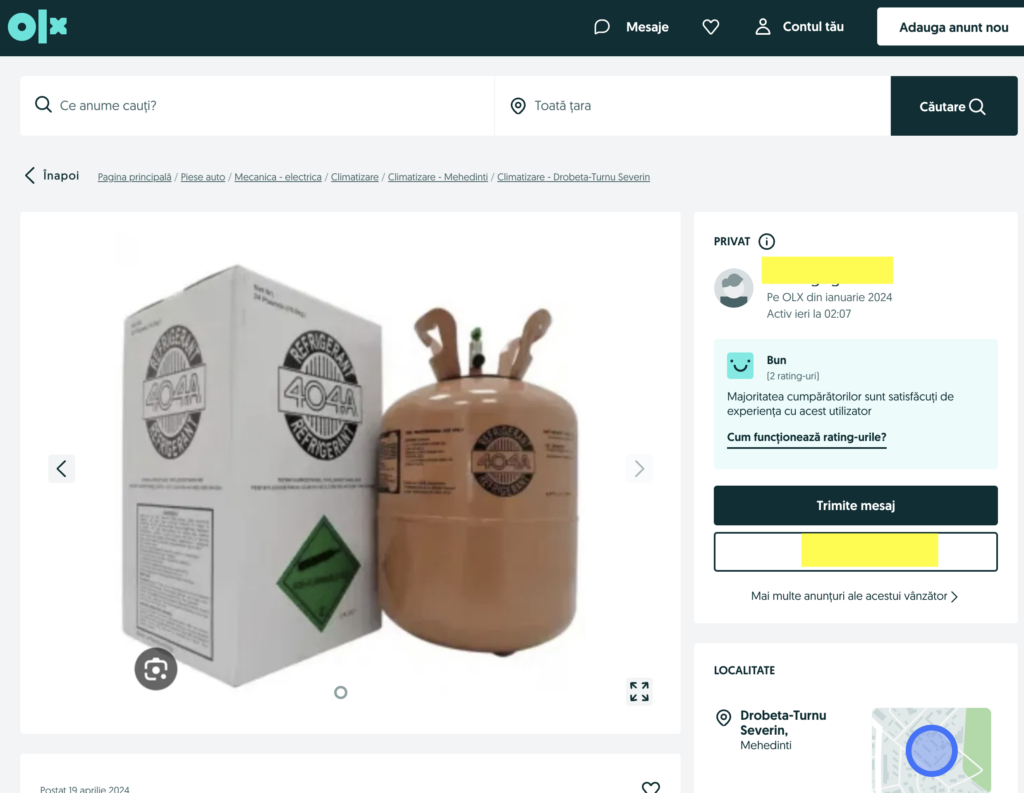
Advertisement on OLX from Drobeta-Turnu Severin, Mehedinți
Fake documents and traffickers left at large
Illegal freon traders are not authorized by the European Commission to trade such industrial gasses, which is why they are forced to cover up their gas stockpiles with fake documents. We have identified several such situations in various criminal cases across the country.
In 2019, for example, an Iveco van driven by a Ukrainian citizen, loaded with 120 single-use, i.e., illegal freon cylinders, showed up at Petea Customs. Customs inspectors asked the transport driver for his documents and found them to be „totally false”.
From the false documents, it appeared that the Ukrainian had come from Portugal in a van to pick up freon from Romania and deliver it to Poland.
According to court documents, in July 2019, in Bistrița, a Romanian citizen loaded the van with freon cylinders and handed the documents to the Ukrainian driver: „an invoice-type document and a CMR-type document, as accompanying documents for the transported goods, while also telling him that if someone asks him where the transported goods are from, he should say that they are from Bucharest.”
„The suspect stated that he was not aware that the two documents were not valid, because he saw that they were stamped and believed them to be valid.”
The documents showed that the shipment came from a Bucharest-based company, King Cold, which did, indeed, operate in the refrigeration field.
Ionuț Constantin, the boss of King Cold, was at home on the Sunday night when the Border Police contacted him. „When they run around with fakes like that, they also make them unverifiable. Luckily, on Sunday evening, when that guy was in customs, I answered the phone,” Constantin told Snoop.
The Border Police asked Constantin if he had any shipments of freon in customs, to which he said no. They asked him for sample invoices and a stamp so they could check the Ukrainian’s documents, and since then no one has contacted him to tell him whether or not the Ukrainian was charged or how his company’s data was used.
The entrepreneur is aware that the market in which he operates is affected by traffickers who provide better offers, but he firmly says that „it seems to me that no one wants to do anything about it.”
”You go on OLX, where everyone’s selling freon. No one’s buying it. You place an order, you called the guy and you’ve caught him. It’s simple enough, but nobody’s doing anything.”
Ionuț Constantin, owner of King Cold
We asked him who was responsible for the smuggled freon and he laughed: „The Environment (Editor’s Note: Ministry) says that it’s the responsibility of the Police, the Police says that it’s the responsibility of the Environment.”
Basically, the traffickers used the identity of a legitimate business to cover an illegal shipment of disposable cylinders. A criminal case was opened against the Ukrainian for forgery and use of forgery, not for international trafficking of dangerous substances. The case has since been closed.
The Environmental Guard cannot „hunt down” freon smugglers
The figures demonstrate that environmental crimes involving freon are treated as marginal facts by the state institutions that are supposed to monitor them. Steluța Popescu, head of the Constanta Environmental Guard, has participated in several actions against freon smugglers, but says that the institution never intervenes when it comes to these toxic gasses, without the request of a criminal investigation body or the Customs Authority. In other words, they cannot „hunt down” freon smugglers.
The head of the Environmental Guard Botoșani testified that, in the case of the capture for which the policemen fired 61 bullets, „we received a request from the Border Police and they asked what the legal framework is for freon. But in general, prosecutors’ offices don’t work with us, they work with the Police.”
Popescu also added that on Romanian territory, after the toxic gasses have crossed the border, there have never been actions against freon sellers, who sell their cylinders directly on online platforms such as OLX or Publi24. If they are not caught at customs, they are free on the black market.
On the other hand, an official response from the General Commission of the Environmental Guard says that they have, in fact, inspected even online middle-men. But they did not provide details on the results of any such operation.
On July 24, 2018, an Opel Vivaro was chased by the Border Police over a distance of 13 kilometers. During the pursuit, the van was assisted by a UK-registered BMW 7 Series, which attempted to block the police crew during the pursuit. The driver only stopped when the police fired warning shots into the air.
When they opened the doors of the van, the Border agents found 110 disposable refrigerant cylinders and the driver had no document for the smuggled goods. When asked why he didn’t stop, he said that the illegal cylinders were not the problem, but that his license was suspended and he was illegally driving on public roads. The latter is also the reason why he was fined. The chemicals, however, although initially confiscated, were later returned to the middle-men after a Ukrainian man named Anatolii brought some supporting documents for them. They were considered to be enough.
Design: Ionuț Mateș
Art: Robert Obert
Translated by Ioana Pelehatăi
Editors: Iulia Roșu și Răzvan Luțac
Thanks: Luiza Vasiliu
Investigația a fost documentată și publicată în cadrul unui grant oferit jurnalistului Victor Ilie de Journalism Fund Europe.



